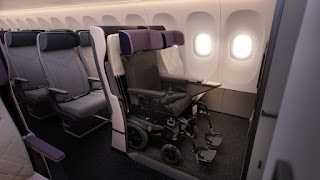Below is reproduced from the Press Release by DeltaTechops.com dated 31 May 2023, without any change.
ATLANTA, GEORGIA
At next week’s annual Aircraft Interiors Expo (AIX) in Hamburg, Germany, Delta Flight Products (DFP) will debut a full prototype of a first-of-its kind airplane seat that allows customers who use a powered wheelchair to remain in their own wheelchairs for the entire journey.
DFP has partnered with UK-based consortium Air4All on the seat, which converts a standard passenger seat to an accommodation for wheelchair restraint.
The patented design offers comfort and safety for all passengers by providing access to headrest, center console tray tables and cocktail table that adjust to serve passengers with wheelchairs in place. The product also enables airlines to retain the design of their cabin on every seat.
Implementation of the seat will also facilitate a more seamless boarding and disembarking experience for PRM.
“DFP delivers highly engineered products and services to fill service gaps, solve operational challenges and transform the experience of customers and crewmembers,” said Rick Salanitri – President of Delta Flight Products. “Air4All is collaborating with DFP and our strong production and manufacturing capabilities to explore new ways to deliver equal access to comfort, safety, and dignity for all customers. This patented design offers new possibilities for customers with disabilities to enjoy a travel experience they truly deserve.”
“An innovation like this in air travel provides those with reduced mobility a safe and comfortable way for them to travel and remain in their own power wheelchair,” said Chris Wood, Founder of Flying Disabled. “It has taken truly a collaborative effort to develop this seat and we believe this product provides an optimal solution for all parties.”
Following the exhibition, the seat will be sent for final design and validation. Testing and certification programs to install the seat will begin once certified.
Delta Flight Products (DFP) is a wholly-owned subsidiary of Delta Air Lines, which is committed to and has long engaged in a variety of initiatives to increase air travel accessibility while continuously innovating and evolving in this space. At Delta, this includes working closely with their long-standing Advisory Board on Disability in creating experiences pertaining to aircraft, airport renovations, procedures and more.
ABOUT DELTA FLIGHT PRODUCTS
Delta Flight Products (DFP) was established to re-think aircraft interiors. DFP offers modern solutions to airline interiors through the engineering and production of cabin design, technological systems, cabin furnishings, food/beverage galleys, and storage equipment. DFP provides full-service engineering, certification, and manufacturing to create innovative aircraft interior solutions to airlines around the world.
ABOUT AIR4ALL
Air 4 All is a consortium formed of PriestmanGoode, Flying Disabled, SWS Certification and Sunrise Medical. Each member of the consortium has a personal and professional commitment to creating solutions around accessibility in air travel. Through a combination of industrial design, passenger experience design, aircraft cabin and airport accessibility, aircraft certification and regulation; and wheelchair design and manufacturing, the consortium has been developing the Air 4 All concept since 2019. It has been recognised as a finalist in the 2022 Crystal Cabin Awards and has featured in media and conferences dedicated to the topic of accessibility across the world.
Source : DeltaTechOps
More information on : AircraftInteriorsInternational dot com.
